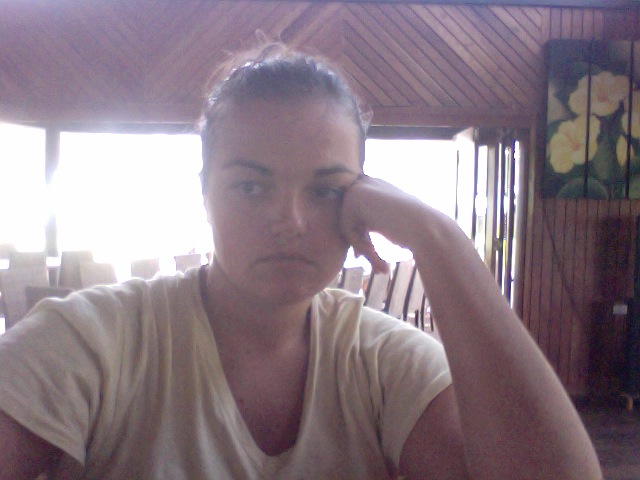Gasping for relief and peace after leaving all of Nakavika in my wake, I finally turned to my taxi driver, a middle-aged, toothless Indo-Fijian with a cheeky grin ready to start some chit-chat. Once again, I had a conversation with a local that scored me points for America in their eyes, and knowing the consequences of getting too invested and connected, I refrained from supplying him with my phone number, which he requested. I remained kind but cold, occasionally hyperventilating from a hard cry long gone. It was a sunny day on the Coral Coast. I made my way to The Uprising and straight to the bar.
The First Step Toward Recovery
Seven hours later, I went to bed (roughly 6:30pm) in a sweaty dorm room after chatting for hours with friends from New Year's Eve, kind and generous bartenders, beer-toting strangers, and the occasional stop from the Judgmental Express, otherwise known as the crispy fella. Though I had found somewhat of a community at The Uprising by this point, I took off the next day for good, returning to Lautoka to speak with our friend and contact from the beginning, Kimbo, and embark on my escape from the Fiji I had known.
Having recently returned from a holiday season back in England, Kimbo was in the midst of cleaning up a mad mess at the Madventure volunteer house. The cyclone did a bit of damage that made trees disappear. Recalling our stories of both good and bad, he was frankly shocked at some of the experiences we had, not expecting certain people to act in certain ways. In hindsight, we definitely should have taken his advice to take a breather from the village every weekend. Lesson learned.
Finding Peace and Reconciliation

Floating up to Waya Lailai Ecohaven, I had two goals: to relax and to sweeten my already-established aftertaste of Fiji. I needed to come to terms with the experience and chew on my real opinions, in order to come home less frazzled and avoid the reverse culture shock that always scares my family.
I started off by reading and sleeping under the shade of the perfect coconut tree beachside. Flying through Tim Ferriss' advice on mini-retirements, I finished my island reading material instantly and looked for more, which came via the kind hands of some new travel friends. Having not yet read the culture/history/background information in the Fiji Lonely Planet, I felt it was due time, but sadly this research made me even more worried and retrospective of my experience. It seemed, based on the worst case scenarios of cultural clashes, that we could have witnessed worse.

From that moment on, I sought as many ears and opinions as possible off of which to bounce the Nakavika Project.
Anna was from Slovenia, a dedicated cultural traveler who was moving through the South Pacific islands. She could compare and contrast Fiji to Vanuatu and New Caledonia, look at this place through the eyes of the region and realize some vital elements that have affected the Fijian mindset. It was tourism. It was the power of the Dollar/Euro/Sterling. It was the history of territorial conquest and the extreme reactions to shame. It was the institution of a patriarchal society. Anna was instrumental in helping me figure out my stance on it all.
Kira hailed from England and was on a, you guessed it, year-long round-the-world experience. Fresh off the volunteer train (from a stint in Guatemala), we chatted for hours on end about the organization of voluntourism, its local acceptance, as well as some personal with cultural clashes. Throughout every meal, she supplied herself as a second opinion, a travel psychologist of sorts, someone she could tell I desperately needed at the time.
And she was not only generous with her time but her reading material.

For the rest of my Yasawa days, I rocked and read a pupu platter of travel narratives, also known as The Best Women's Travel Writing 2009. The compilation provided the essential escapism I craved at the time. But when the flashbacks to Nakavika came rearing their heads, I stopped skimming tales from around the globe to address those pressing issues.
One of my vacation days, I spent the entire afternoon purging my thoughts into a letter for the Turaga ni Koro, sandwiching my stance on our issues with apologies and calls for agency. I let it all out, as diplomatically as possible, and when it was complete, I felt relieved. We wanted to nurture the seed of our project by building that bridge between us and them...to become "thus" - one. When I thought to my online portrayal of the project, I got ancy, thinking about all the missing gaps in the storyline, and sorted out the timeline for the readers. Seemingly, I came to terms with Fiji, the Nakavika Project, and my usage of these winter months away from my ailing grandmother.

I seemed to find the relief I sought on the boat ride over: reconciliation (however mild) with the South Pacific.
I found its sweetness, rediscovered the serenity of village life [by visiting the nearby local community], and realized the name of my favorite Pacific scent: frangipani. I claimed the sense of adventure and discovery that brought me here, though still feeling crippled, I was once again human. It took the healing effects of traveling strangers, a medicinal hammock on the beach, and the simple inclusion of commerce to bring me back to a reality I recognized.
And before I knew it, I was boarding the return flyer to Viti Levu and trying to find a hostel that would have me for one night before my flight home. It felt like I was on the cusp of waking up from a very strange dream.

